TAIPEI, Taiwan, March 20 —
President Chen Shui-bian of Taiwan was declared to have won a second term by a
razor-thin margin on Saturday, but the opposition Nationalist Party called for
the election to be annulled and suggested that the president might have staged
an 11th-hour assassination attempt to get votes.
The Central Election Commission declared that President Chen had 29,518 more
votes than Lien Chan, the leader of the National Party, out of 13.25 million
ballots cast, awarding another four-year term to the man whom mainland China,
the rival across the Taiwan Strait, has repeatedly labeled as dangerous and
willing to risk war to achieve greater independence for this island.
In calling for a court-supervised recount and promising a separate lawsuit to
have the entire election annulled, Mr. Lien cited a large number of invalid
ballots and uncertainty about what happened on Friday afternoon when President
Chen was shot while riding in a motorcade through his hometown, Tainan, in
southern Taiwan. He suggested that the shooting might have swayed voters toward
Mr. Chen.
"The slim gap has been achieved under layer upon layer of
suspicion," Mr. Lien told a teary-eyed crowd of supporters. "It is not
a fair election. Prepare to annul the election."
The commission declared 337,297 ballots to be invalid — more than 11 times
President Chen's apparent margin of victory. There was uncertainty Saturday
night over whether polling places had followed consistent standards in counting
votes.
Mr. Chen's top aides said that the assassination attempt was real and that
there was no evidence of fraud in the vote and no need for a recount.
The disputed outcome complicates what had already become a delicate
diplomatic test for China, which claims sovereignty over Taiwan, and the United
States, Taiwan's main ally. China remained officially neutral in the election
but clearly favored Mr. Lien, who says he would like to improve relations with
China.
Chinese leaders have long feared that Mr. Chen wants to lead Taiwan toward a
formal independence, and they have vowed to prevent that by using military force
if necessary. If his victory stands, the immediate prospects for reducing
tension across the strait appears remote.
Addressing a cheering crowd of supporters of his Democratic Progressive Party
on Saturday night, Mr. Chen asked Communist Party officials in Beijing to
respect the election and cooperate with him.
"I urge the Chinese authorities to face the election and the referendum
with a positive attitude and accept the choices of the Taiwanese people,"
he said.
Mr. Chen had angered Beijing by holding a referendum on cross-strait issues
in tandem with the presidential poll, a move the United States also criticized
as an election ploy that might inflame tensions. But in a silver lining for
Beijing, the referendum failed to garner the 50 percent voter participation
necessary to be considered valid. While 80.3 percent of eligible voters cast
ballots in the presidential election, only 45 percent cast ballots on the two
referendum questions, both on cross-strait relations, after the Nationalists
called for voters to abstain.
The Taiwan Affairs Office in Beijing issued a statement that welcomed the
failure of the referendum, but did not address the acrimonious vote for the
presidency.
In Washington, Adam Ereli, the deputy spokesman for the State Department,
said the United States was confident that both sides in Taiwan would pursue
legal means to resolve their differences.
Taiwanese officials of both parties had hoped that this election would
solidify the island's democracy and draw a sharp contrast with the still
repressive rule in China. The election may prove instead to be a severe test of
political stability and the independence of the courts, which will be asked to
rule on the vote.
Senior officials from both parties compared the disputed vote here to the
problems in Florida in the 2000 election.
Mr. Lien had been narrowly favored to win until the shooting on Friday. One
or more bullets grazed President Chen's lower abdomen and Vice President Annette
Lu's right knee while they were riding in a motorcade through Tainan.
Su Chi, a senior adviser to Mr. Lien and a top Nationalist Party official,
said Saturday night that the shooting raised a number of questions that
investigators did not have time to answer before the vote.
He said Mr. Chen, running for office in Tainan 18 years ago, appeared at an
election-eve rally with an intravenous drip and claiming that he had been
poisoned by the Nationalists, then the governing party. He appeared healthy the
next day, Mr. Su said, saying the poisoning charge was an election gambit.
Hsiao Bi-khim, spokeswoman for the Democratic Progressive Party, denied that
Mr. Chen had feigned the poisoning.
Mr. Su also said the party had obtained documents from Taiwan's Secret
Service showing that the hospital Mr. Chen was taken to was not the one
designated by the presidential guard to treat him in case of emergencies, and
was further from the scene.
"The only explanation was that he wanted to go to an environment that he
could control," Mr. Su said. "If you go to a public hospital, someone
would spill the beans."
Ms. Hsiao said the private hospital where Mr. Chen received treatment was not
on one of the Secret Service's lists because it did not have a helicopter pad.
But she said the private hospital was on an internal list of acceptable
hospitals.
Separately, Mr. Su said the number of ballots ruled invalid was too large and
noted that an above-average number of ballots had been declared invalid in
Tainan. He said the Nationalists would demand a recount and file suit in the
High Court of Taiwan to overturn the election.
"We still want to go through the legal approach," he said. "We
don't want to go through the activist, populist approach. We are not
revolutionaries. We are stabilizers."
One reason there may have been so many invalid ballots is that a coalition of
nonprofit groups had called on voters to cast invalid votes. This was meant to
protest that the main political parties were too interested in relations with
China and the concerns of the affluent, and had not paid enough attention to the
plight of the poor and the disabled.
Voters in Taiwan are given a paper ballot, a stamp and an ink pad, and asked
to mark the name of the candidate they prefer. The ballots are counted by hand.
Ms. Hsiao said the protest vote was the "only explanation" for the
number of invalid ballots, and she criticized the Nationalists for alleging
fraud.
Warren Mitofsky, an American pollster who helped a local television station
conduct surveys of voters leaving the polls, said the only voters among whom Mr.
Chen commanded a clear lead were those who made up their minds in the past week.
Mr. Mitofsky's exit polling had shown Mr. Lien winning the vote by a solid
margin of 6 percentage points — 53 percent to 47 percent — until official
results from many precincts began pouring in.
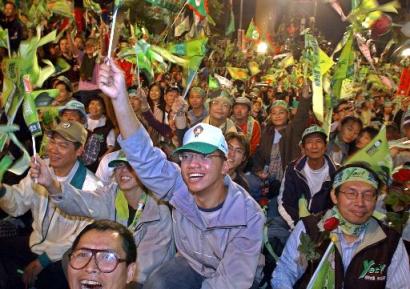 Among the shooting's odd elements was the seemingly relaxed security around
the president. He stood in a roofless vehicle driven slowly through a crowded,
two-lane street. Neither he nor Ms. Lu wore bulletproof vests. Spectators freely
exploded firecrackers along the route, and the police said no one, including the
president's bodyguards, had heard shots being fired.
Among the shooting's odd elements was the seemingly relaxed security around
the president. He stood in a roofless vehicle driven slowly through a crowded,
two-lane street. Neither he nor Ms. Lu wore bulletproof vests. Spectators freely
exploded firecrackers along the route, and the police said no one, including the
president's bodyguards, had heard shots being fired.
Among other unanswered question were why both the president and vice
president suffered light surface wounds despite being struck by bullets. The
bullet that hit the president ended up lodged in his clothing and was discovered
after he arrived at the hospital, medical officials said.
The police said that one or more handguns were used in the shooting and that
the bullets found, one made of lead and the other of copper, were likely to have
been homemade.
The pace of the investigation seemed somewhat casual. Cordons had been
removed from the suspected shooting site by Friday night, and car and pedestrian
traffic around the area appeared normal.
Lin Chun-hong, who runs a small sundry shop near the spot in the road where
the police believe the shooting took place, said his 20-year-old son, Chia-rong,
discovered two spent cartridges on the road more than three hours after the
shooting, allowing the police to pinpoint the suspected spot where the shots
were fired.
"The cartridges were sitting under a police car that was parked
there," Mr. Lin said Saturday morning. "Later they drove the car away
and we found them."
When Mr. Chen showed up to vote at his usual polling place in another
elementary school in eastern Taipei on Saturday morning, he was led into the
building by guards brandishing assault weapons, a rare sight in Taiwan, where
the police are mostly not armed and the presidential bodyguard seldom shows any
weapons.
Mr. Chen walked more slowly than usual. But he still waved enthusiastically
to a throng of supporters near the school entrance. Using a popular nickname for
himself, he proclaimed a divine purpose in his survival.
"God hoped A-bian could come vote for the referendum, and so did not
allow A-bian to die for the moment," he said.
Taiwan's President
Narrowly Wins Reelection
Referendum on Strengthening Defense Against China
Fails
By Philip P. Pan
Washington Post Foreign Service Saturday, March 20, 2004; 6:34
PM
TAIPEI, Taiwan, March 20 -- Taiwanese President Chen Shui-bian won re-election
by a slim margin Saturday, but his opponent refused to accept the results,
accused him of foul play and demanded a recount, throwing the island's political
system into turmoil one day after the president was shot and wounded in an
apparent assassination attempt.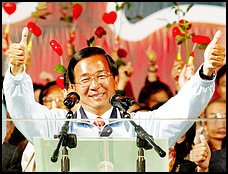
If Chen's victory stands, it would be a major setback for the Chinese
government, which has refused to open talks with him during his first term and
had quietly hoped he would be defeated. China claims sovereignty over this
self-governing island of 23 million and has threatened to seize it by force if
it formally declares independence.
While Chen's opponent, Nationalist Party leader Lien Chan, promised a
conciliatory approach to China, Chen has aggressively promoted Taiwan's
independence and both U.S. and Chinese officials are worried he might provoke a
war.
In a win for China, though, election authorities nullified the results of a
controversial referendum championed by Chen because not enough voters took part
in it. Beijing had condemned the referendum on relations with China and
strengthening the military as an attempt to set a precedent for an island-wide
vote on independence, and persuaded the United States, Japan and several other
nations to criticize Chen for going ahead with it.
"The referendum turned out to be invalid," said a statement by the
Chinese government. "Facts have proven that this illegal act goes against
the will of the people. Any attempt to separate Taiwan from China is doomed to
failure."
Chen won 50.1 percent of the presidential vote, barely edging out Lien, who won
49.9 percent, the island's election commission said. The margin of victory was
only 29,518 votes in a race in which nearly 13 million people, or 80 percent of
all eligible voters, cast ballots.
Before the final count was announced, Lien appeared before a large crowd outside
his campaign headquarters and declared on national television he would challenge
the validity the election. He cited irregularities in the ballot-counting
process and unspecified "doubts" about Friday's shooting, which may
have swayed voters toward Chen in the final hours of a tight race.
Some opposition lawmakers have alleged, without any evidence, that Chen somehow
staged the shooting in an eleventh-hour bid for sympathy from voters. The
president and his vice president, Annette Lu, suffered flesh wounds from shots
fired into their motorcade as they campaigned in the southern city of Tainan.
"Its impact on this election was direct," Lien said, who described the
timing of the shooting on the eve of the election as suspicious. "The
doubts surrounding it give us one impression: This was an unfair election."
Lien also raised questions about 337,297 ballots that election authorities
declared invalid, more than double the number of ballots invalidated in Taiwan's
last presidential election. His campaign filed lawsuits early Sunday demanding
that ballot boxes from all 13,000 polling places across Taiwan be seized and
sealed pending a full investigation, a campaign lawyer said.
The opposition's challenge to the election may test the strength of Taiwan's
democratic system, which managed its first transfer of power between political
parties only four years ago. In particular, Taiwan's judiciary, which has been
asked to rule on the vote, is generally held in low regard by the public and
rarely serves as the final arbiter in political disputes.
Crowds became violent in the third-largest city, Taichung, according to the
Associated Press. Hundreds of people pushed over a metal barrier at a
courthouse, shoved their way through a police line and began smashing windows
with their bare hands. Many chanted, "Check the ballots!" as police
tried to restore order, the AP said.
But speaking to a joyous crowd of thousands that filled the streets outside his
campaign headquarters, Chen declined to address Lien's accusations and claimed a
full victory. He urged his supporters not to gloat and reached out to Lien and
his vice presidential candidate, James Soong, by expressing his "highest
respects."
"The election is over, and even though there are people who have different
ideologies and beliefs, from now on we must all embrace each other," Chen
said. "This is not only my appeal. It is a solemn request. The whole world
is watching Taiwan's democracy."
In his victory speech, Chen played down the failure of the referendum, saying
that citizens did not fully understand its "democratic value" and
noting that it still made history as the first to be held in Taiwan.
Chen sounded a more moderate tone toward China than during his campaign. He
repeated his call for China to remove missiles aimed at Taiwan but refrained
from mentioning a promise to write a new constitution for the island, a move
that Beijing has described as equivalent to a declaration of independence and a
potential cause for war.
"We sincerely ask the Beijing authorities across the strait to view the
election result from a positive perspective and to accept the democratic
decision of the Taiwanese people," he said. "Let us together open the
door to peaceful and stable cross-strait dialogue and negotiations."
Only 45 percent of eligible voters cast a ballot in the referendum, short of the
majority needed for it to be valid. Supporters of Lien and his vice presidential
candidate, James Soong, had boycotted the referendum, arguing Chen did not have
the legal authority to call the vote.
Of those who took the time after voting for Chen and Lien to enter two other
booths and participate in the referendum, more than 90 percent said yes to the
two questions: whether to try to set up a framework for direct talks with China,
and whether to buy more advanced weapons if China refuses to move about 500
missiles aimed at the island.
At a news conference after the speech, senior officials in Chen's Democratic
Progressive Party said they did not object to Lien exercising his right under
Taiwan's election laws to ask a court for a recount. But they said Lien had yet
to present any concrete evidence of wrongdoing that might convince a judge to
grant the request.
Bikhim Hsiao, a legislator in the Democratic Progressive Party leadership,
attributed the large number of invalid ballots to a campaign by a coalition of
independent politicians who had urged voters to file invalid ballots as a
protest against the dominant political parties.
She expressed concern that statements made by Lien Soong challenging the
election could prompt rioting by their supporters. "It has been a painful
campaign for many people, and we are urging everyone to remain calm," she
said.
She said security had been increased around the president, the vice president
and their family members. Police said they had not detained any suspects in the
shooting, and government officials said they were treating the case as a
criminal investigation, not an attack that involved China.
In Taipei, police were out in force to maintain order, cutting off some streets
with barbed wire. As a precaution, officers with riot gear lined up outside the
court building in Taipei where the Lien campaign had sent lawyers to file their
complaint.
"Any attempt to instigate riots or create instability in society will be
harmful to the interests of Taiwan, and we condemn such actions," said
Frank Hsieh, the mayor of Kauhsiung.
Early Sunday, Lien and Soong led a crowd of supporters on a march to the
presidential office, where they sang the national anthem soon after sunrise.
Taiwan's president re-elected one
day after assassination attempt; Military referendum fails
By William Foreman, Associated Press, 3/20/2004 16:14
TAIPEI, Taiwan (AP) President Chen Shui-bian claimed victory in a close race
for re-election Saturday after surviving an assassination attempt, but his
opponent challenged the results and raised questions about the shooting and its
effect on voters.
While claiming victory in the presidential contest, Chen clearly lost a
simultaneous referendum to strengthen Taiwan's military. The ballot question
fiercely opposed by China, which saw it as a rehearsal for a vote on Taiwan
independence failed because not enough voters participated.
Protests erupted around the island, as thousands took to the streets
demanding that officials investigate alleged irregularities in the election,
which Chen won by only 30,000 votes.
Riot police were deployed as the government tried to head off a political
crisis that could pose a serious challenge to Taiwan's young democracy, which
has had only two other direct presidential elections in the past eight years.
Crowds became violent in the third-largest city, Taichung. Hundreds of people
pushed over a metal barrier at a courthouse, shoved their way through a police
line and began smashing windows with their bare hands. Many chanted, ''Check the
ballots!'' as police tried to restore order.
The hot tempers and scuffles were part of two days of political drama that
began with an attempt to assassinate Chen and Vice President Annette Lu as they
campaigned in southern Taiwan.
A bullet grazed Chen's stomach and Lu was hit in the knee as they rode in a
Jeep. Neither was seriously injured, and police have not identified any
suspects.
Before the election, challenger Lien Chan said he trusted that Taiwanese
voters would be rational and not let the shooting cause them to cast a sympathy
vote for Chen. But after he lost the election, Lien changed his mind.
''This was an unfair election,'' Lien told a crowd outside his campaign
headquarters.
Some have suggested that Chen's shooting was staged to swing the election in
his favor.
''The gunshots looked very fishy,'' said Su Chi, a senior campaign official.
Lien did not go that far, but he demanded a full investigation of the
attack's effect on the election. He also said 330,000 invalid ballots should be
inspected.
Lien demanded that the Central Election Commission seal all ballot boxes in
the 13,000 polling booths around the island so a recount could be done.
His running mate, James Soong, added, ''There are clouds of suspicions around
this election.''
Wen Yao-yuan, a high court judge, said 21 courts around the island were
authorized to handle the sealing of ballot boxes.
''As long as the courts have certain evidence, not necessarily concrete
evidence, they'll handle it,'' Wen said.
The assassination attempt was being treated as a criminal case and not a
conspiracy or an attack that involved China, prosecutor Wang Sen-jung said
Saturday.
Chen won the presidential ballot with 50.1 percent of the vote, the Central
Election Commission said. Lien of the Nationalist Party came away with 49.9
percent. About 13 million ballots were cast. Turnout was 80 percent, the
commission said.
Although Chen won, the referendum he was pushing failed because many voters
decided to boycott it. The ballot asked whether the island should step up
defenses against China and seek talks with Beijing. China and Taiwan split amid
civil war in 1949, and China wants the island to rejoin the mainland.
Beijing has threatened to attack if Taiwan seeks a permanent split.
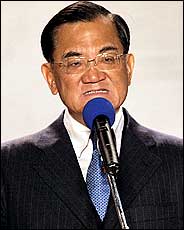
Agence France-Presse
Lien Chan, the Nationalist Party
candidate, called for ballot boxes from all 13,000 polling places
nationwide be impounded and the votes to be recounted. |
The opposition Nationalist Party argued that Chen did not have the legal
authority to call the referendum and successfully rallied most people to skip
the vote.
Chen shrugged off the defeat in his victory speech, saying people did not
seem to understand the referendum's contents. But he appealed to China to
respect the election.
''It is a new era for solidarity and harmony and a new era for peace across
the Taiwan Strait,'' Chen said. ''We sincerely ask the Beijing authorities
across the strait to view the election results from a positive perspective, to
accept the democratic decision of the Taiwanese people.''
But Beijing's Taiwan Affairs Office said in a statement the referendum failed
because it went ''against the will of the people,'' China's state-run Xinhua
News Agency reported.
''Any attempt to separate Taiwan from China is doomed to failure,'' the
office said.
It would have been hard to find candidates more different than Lien and Chen.
Chen, 53, grew up in a poor village and graduated from Taiwan's top law
school. He got into politics by defending dissidents during the martial law era,
which ended in 1987. He has been a legislator and Taipei mayor.
Lien, 67, belongs to one of Taiwan's richest families. The former political
science professor served as an ambassador, foreign minister, premier and vice
president in the former Nationalist government.
NPR
report from Taipei: Radio
Clip 3/20/04
----------------------------------------------------------------------------------------------------------
Taiwan's president is reelected;
his rival rejects tally
Serious setback seen for Beijing
By Philip P. Pan, Washington Post, 3/21/2004
(printed in Boston Globe 3/21/04)
TAIPEI -- President Chen Shui-bian of Taiwan won reelection by a slim
margin yesterday. His opponent declined to accept the results, accused him of
foul play, and demanded a recount. The island's political system seemed to be
in turmoil, a day after Chen was wounded in an apparent assassination attempt.
Today, Taiwan's High Court ordered the sealing of all ballet boxes, saying it
needed to preserve evidence.
If it stands, Chen's victory would be a major setback for the Chinese
government, which has refused to open talks with him in his first term. China
claims sovereignty over this self-governing island of 23 million and has
threatened to seize it by force if it formally declares independence.
Chen's opponent, Lien Chan of the Nationalist Party, had promised a
conciliatory approach to China. Chen himself has aggressively promoted Taiwan's
independence, and both US and Chinese officials have expressed concern that he
might provoke a war.
However, election authorities nullified the results of a referendum
championed by Chen because not enough voters had taken part. Beijing had
condemned the referendum on relations with China and on strengthening the
military as an attempt to set a precedent for an island-wide vote on
independence, and persuaded the United States, Japan, and several other
countries to criticize Chen for going ahead with it.
"The referendum turned out to be invalid," said a statement by the
Chinese government. "Facts have proven that this illegal act goes against
the will of the people. Any attempt to separate Taiwan from China is doomed to
failure."
Chen won 50.1 percent of the presidential vote, barely edging Lien, who won
49.9 percent, the island's election commission said. The margin of victory was
29,518 votes in a race in which nearly 13 million people, or 80 percent of all
eligible voters, cast ballots.
Before the final count was announced, Lien appeared outside his headquarters
and declared on national television that he would challenge the validity of the
election. He cited irregularities in the ballot-counting process and unspecified
"doubts" about Friday's shooting, which may have swayed voters toward
Chen in the final hours of a tight race.
Lien also raised questions about 337,297 ballots that election authorities
declared invalid, more than double the number of ballots invalidated in Taiwan's
last presidential election. His campaign filed lawsuits early today demanding
that ballot boxes from all 13,000 polling places be seized and sealed pending a
full investigation, and Taiwan's High Court granted the request. The
opposition's challenge may test the strength of Taiwan's democratic system,
which managed its first transfer of power between political parties only four
years ago. In particular, Taiwan's judiciary, which has been asked to rule on
the vote, is generally held in low regard by the public and rarely serves as the
final arbiter in political disputes.
Police unrolled barbed wire and set up barriers to maintain order as crowds
gathered at courthouses and other government buildings across the island.
Television showed clashes in the cities of Kaohsiung and Taichung.
In Taichung, in the center of the island, hundreds of people pushed over a
metal barrier at a courthouse, shoved through a police line, and began smashing
windows. Many chanted, "Check the ballots!"
Speaking to a joyous crowd of thousands in the streets outside his campaign
headquarters in Taipei, Chen declined to address Lien's accusations and claimed
a full victory. "The election is over, and even though there are people who
have different ideologies and beliefs, from now on we must all embrace each
other," Chen said. "This is not only my appeal. It is a solemn
request. The whole world is watching Taiwan's democracy."
Chen assumed a more moderate tone toward China than in his campaign. He
repeated his call for China to remove missiles aimed at Taiwan, but refrained
from mentioning a promise to write a new constitution for the island, a move
that Beijing has described as a potential cause for war.
Taiwan split after vote
By Angus Foster BBC News Online, Taipei
President Chen Shui-bian's victory in Saturday's election gives him four more
years in power to carry on his mission to change Taiwan and its relations with
China.
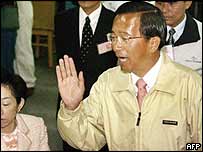
The opposition claims Chen benefited from public sympathy
|
But the narrowness and style of that victory means he is in danger of inheriting
a country divided.
Even before the result was clear, the opposition alliance led by the
Kuomintang (KMT) was complaining the election was not fair.
KMT activists alleged that the shooting of Mr Chen and Vice-President Annette
Lu on Friday was staged, in order to swing the vote.
Far-flung conspiracy theories are not new to Taiwan elections, and these
allegations may well be forgotten as more details emerge of the apparent
assassination attempt.
But what will remain is a deep bitterness among KMT supporters that, as they
see it, the shooting incident robbed them of victory.
Poll predictions
Internal KMT polls were giving them a clear lead three days before the
election. It is unclear how many people were swayed into voting for Mr Chen
because of what happened. However, KMT supporters were convinced that enough
voters changed their minds to alter the result.
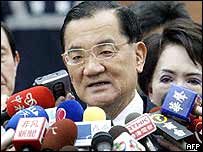
Lien says that the election was unfair
|
Alice Chu, a supporter at KMT headquarters, said: "People feel very angry.
TV yesterday was reporting Chen's accident all day, all night, of course it made
a difference.
"The whole thing is unfair."
The charge, and the allegations that the shooting was staged, were furiously
denied by Mr Chen's Democratic Progressive Party (DPP), which said it won the
election fairly.
Presidential adviser Joseph Wu said: "Some people might speculate that
we got a sympathy vote, but a (private) opinion poll conducted before the
shooting showed us 2% ahead".
The narrowness of Mr Chen's victory - he won by less than 30,000 votes,
compared with 300,000 four years ago - also suggests he will have to move
forward carefully, because he can hardly claim a sweeping mandate.
This is probably most clearly the case in Taiwan's relations with China,
which still regards the island as its territory and threatens to invade if
Taiwan ever declared independence.
Referendum precedent
Mr Chen lost a referendum that was put to voters at the same time as they
cast their presidential ballot, on how to deal with China.
Not enough voters supported the proposals for them to be passed. That result
backed up opinion poll and anecdotal evidence that suggests Taiwan's people are
also deeply divided over how to deal with China.
On one side are Mr Chen and his DPP, who favour standing up to China and
eventual independence.
On the other are a large number of people who favour the status quo and are
wary of doing anything to upset China, and a smaller group who favour
reunification.
Mr Chen now faces the extremely difficult task of finding some kind of middle
course - a concession his opponents do not think he is capable of making.
"Tensions probably will rise," said KMT legislator John Chang.
"Mr Chen will try his best to get his name in the history books, and
that means moving Taiwan closer to independence," he said.
Mr Chen's critics had argued all along that the referendum was designed to
help his re-election, and losing it may not worry him. But the referendum's real
significance is that, by being the first in Taiwan's history, it established the
legitimacy of such an exercise, and makes it possible for Mr Chen to return to
the people with other questions.
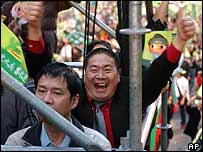
Not everyone is likely to be as ecstatic as these Chen supporters
|
China, which has long been suspicious of his intentions, fears he is
positioning himself to hold a referendum on Taiwan's constitution, which his DPP
argues is out of date and leaves Taiwan with a mixed presidential and
parliamentary system.
But many observers - including military analysts in Beijing - believe the
constitution argument is another device whereby Mr Chen will move Taiwan closer
to formal independence.
If so, the question is how far China allows him to move before it reacts with
more than angry words and, as happened in 1996, missile tests.
Mr Chen's main adviser on mainland affairs, Tsai Ing-wen, said she hoped
Beijing would change its stance towards Mr Chen now he had four more years in
office.
During his first term, China laid down preconditions for talks which Mr Chen
was unwilling and politically unable to meet, so relations have become frozen.
"Taiwan seems to be moving away from them," said Ms Tsai, referring
to Beijing's leaders.
"They should look at what they have done wrong in the past four years,
and that is their refusal to talk," she said.
But it is extremely difficult to see how China's suspicions of Mr Chen can be
allayed.
Taiwan holds legislative and local elections over the next two years, and if
he is to mobilise the DPP support base, Mr Chen needs to talk tough on China.
And if he presses ahead with a referendum on the constitution - which could
be held as early as 2006 - China is likely to speed up its missile deployment,
not press for talks.
"We are in a very dangerous domestic and international game," said
political analyst Yu-shan Wu.
"Domestically we have ethnic tensions building up, and internationally
we have China's growing arsenal of missiles pointing against us.
"But Taiwan is a great survivor, it continues to do wonders. We could
yet muddle through," he said.
陳水扁當選感言:台灣民主與人民的勝利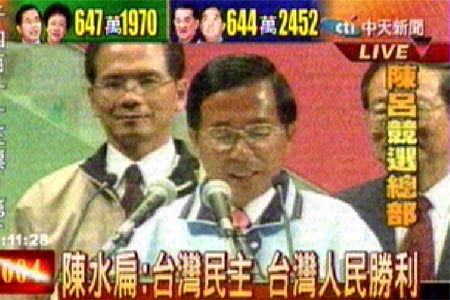
【聯合新聞網】在總統大選結果大致底定後,陳水扁總統在台北時間晚間十時,與夫人吳淑珍一同出現在陳呂競選總部舞台上,對民眾發表當選感言。
陳總統首先感謝國人同胞支持,除民進黨同志的共同打拚外,並感謝台聯和各界的相挺。他強調,這場選舉是台灣民主的勝利,也是台灣人民的勝利。除了誠心乞求民眾,支持者不可驕傲;而不同理念的人,也能摒除歧見,相互擁抱。他說:台灣的民主全世界都在看。
他也對競選對手連宋,提出他的最高敬意,並感謝他們的指教。有嚴格的批評,才有進步,希望大家為台灣前途共同打拚。
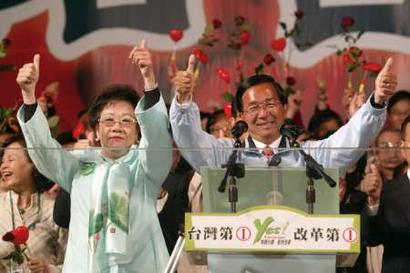 陳總統也呼籲大陸當局,接受台灣民主的選擇,認真看待大選及公投結果,共同開創兩岸和平穩定。兩岸人民相同的聲音,也是國際社會的期待。陳總統表示:「這是新時代的開始,一個國內團結的時代、一個兩岸和平的時代。在強化國防及兩岸對等談判兩項國內公投議題上,也會提出相應具體的作為,以呼應公投的的選舉結果,也呼籲對岸中共當局,盡快撤除對台的武力威脅。」
陳總統也呼籲大陸當局,接受台灣民主的選擇,認真看待大選及公投結果,共同開創兩岸和平穩定。兩岸人民相同的聲音,也是國際社會的期待。陳總統表示:「這是新時代的開始,一個國內團結的時代、一個兩岸和平的時代。在強化國防及兩岸對等談判兩項國內公投議題上,也會提出相應具體的作為,以呼應公投的的選舉結果,也呼籲對岸中共當局,盡快撤除對台的武力威脅。」
陳總統提到320公投,是台灣民主大步向前推進,也是台灣人民要民主、愛和平的表現。扁及執政團隊,並鞠躬向全國二千三百萬同胞表達謝意。
連最後一搏
賭上國親前途
羅如蘭/特稿
對連戰而言,這一次的敗選肯定和上次敗選滋味不同。這次,他更有資格驕傲地宣稱:「這美好的一仗我已打過」。但是,要連戰說出「酒店打烊就走人」這樣的話,顯然並不輕鬆。
退休當然很輕鬆,不輕鬆的是選民的負託,沉重的是未完成的政治責任。連戰因此做出拒絕接受選舉結果的重大決定;這個決定不只將要賭上國親的前途,也將賭上台灣的未來。
在可預見的一、二個月之內,全台社會將要為選舉結果的不確定付出何種代價,恐怕無人能夠估計。決定二度參選,連戰考慮了三年,決定拒絕接受選舉結果,連戰考慮了卅分鐘。無論這是不是一場豪賭,連戰都賭得很堅決。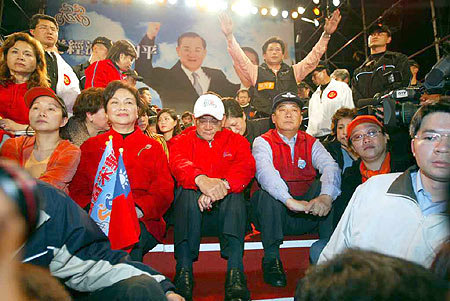
比起上次的二百八十萬票,這次六百卅四萬票的意義,不僅只是數字增加,而在於每一票,都是連戰扎扎實實掙來的。忠貞支持者,在每一場造勢活動中,用眼神傳遞期待,用雙手表達熱情,用歡呼放送他們的渴望,群眾徹底改造了連戰,使他在這場選戰中成為真正的主角也是藍軍真正的主帥,也使連戰難以接受他無以回報的挫折。
嚴格說起來,連戰的老式政治作風,確實不適合現代快節奏的媒體政治。他不會表演,不會煽動的語言,文謅謅的學究風格,有時引起官僚的誤解;看得遠,有時被認為反應慢;過於堅持原則,常常被認為不會打選戰;他表情木訥,因此常被認為缺乏感情;和他的對手相比,簡直是兩個反面。
但毫無疑問的,連戰在這場選舉中表現的毅力、堅持、沈穩和領袖魅力,可圈可點,半數的選民未必喜歡他的老政黨,卻喜歡他,只可惜少了二萬多人。
儘管落敗,但連戰已經以自己的方式,在第二次選戰中,一雪前恥。他昨天並無悲傷,面對流淚請罪的部屬,他只是眼眶一度泛紅,堅定地號令反擊。
不善言語的連戰,在這次選戰中以「改變才有希望」一書,詳細描述了他的施政藍圖和理念。就一個國家領導人的格局來說,按表操課已綽綽有餘。但連戰現在甚至不知道,他到底有沒有機會將這樣的精神遺產,傳承給他的黨。
宋楚瑜光環
破不了綠色魔咒
黎珍珍/特稿
雖然一再強調自己「吃台灣米、喝台灣水」長大,「外省人」始終是宋楚瑜從政生涯中難以洗脫的「原罪」。雖然省府團隊的效率有口皆碑,省政府對地方建設的用心並沒有南北之別,但「宋省長」的光環,似乎還是破不了南台灣的綠色魔咒。
二○○○年總統大選,宋楚瑜受「興票案」所累,以卅萬票的差距落敗。支持者在激憤的情緒下簇擁宋楚瑜成立了親民黨,希望四年後東山再起。但歷史的轉折永遠難以預料;陳水扁以核四停建打了連戰一巴掌,促成了連宋兩人「大和解」,而在去年情人節連宋配正式成形之前,很少人相信有四百六十六萬票實力的宋楚瑜,願意甘居連戰的副手。
宋楚瑜有一副標準的湖南騾子脾氣,外界越是不看好,他就越要做到。願意和連戰搭檔,固然著眼於勝選機率大,但多少也是衝著不滿綠營等著看連宋再度分裂的笑話。連宋個性南轅北轍,民進黨從不放棄做「宋強連弱」的文章。也是衝著這點,宋楚瑜調整自己,貫徹一個副手的本分。即便連戰不在身邊,他一樣言必稱連戰;宋楚瑜不止一次在造勢場合強調,他不在乎自己的位置,但是一定要幫助連戰打贏這場選戰。
但宋楚瑜的衝動個性,仍然常讓外界對連宋關係產生錯置感。在雲林向張榮味天外一跪,雖然很快被定位為至情至性,但泛藍內部其實褒貶不一。而宋楚瑜始終對副總統兼任閣揆問題不肯鬆口,也讓對手有挑撥泛藍選後權鬥的空間。宋楚瑜的個人魅力和單兵作戰的能力,讓他成為最受注目、卻也最具爭議性的副總統候選人。
省府經驗是宋楚瑜最引以自豪的從政歷程。做為副手,宋楚瑜很難開口談政策,但朗朗上口的建設績效,是他和鄉親搏感情最好的橋樑。他努力地用台語、客語拉近距離,努力地跑遍全台三一九個鄉鎮;上山下海,造橋鋪路,看到每一個縣市、每一個鄉鎮都有省府建設的成績,就是他最大的驕傲。
但這樣的努力,似乎並不能讓人忘記他的出身。宋楚瑜曾經自豪地說,做不做總統對他而言並不重要,他是台灣第一個民選省長,而因為凍省,也是台灣唯一的民選省長,這樣的頭銜再也無人能得。儘管再一次在總統大選。
2004.03.21 中國時報
日本記者看台灣總統大選
中央社
二十日進行的台灣總統大選吸引全球媒體的注意,鄰國日本也不例外,台灣選戰造勢的狂熱和選民對政治的超高關心度與日本選戰氣氛的低迷,形成了強烈的對比,令日本記者嘆為觀止;他們認為選舉引發史無前例的抗議行動正考驗著台灣的民主化,也是台灣展現民主成熟度的一個良機。
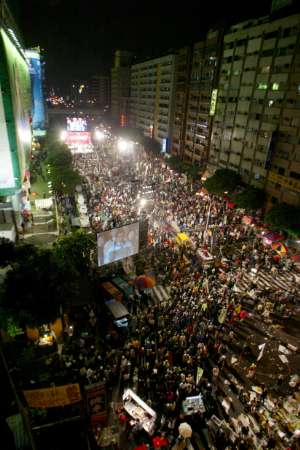 產經新聞駐台北支局長河崎真澄指出,本屆總統選舉超過八成的投票率大約是日本國政選舉平均投票率的兩倍,台灣選民對選舉的投入度和對政治的關心反映出民主化的發展,也凸顯台灣政治的特色。
產經新聞駐台北支局長河崎真澄指出,本屆總統選舉超過八成的投票率大約是日本國政選舉平均投票率的兩倍,台灣選民對選舉的投入度和對政治的關心反映出民主化的發展,也凸顯台灣政治的特色。
河崎指出,陳水扁總統獲選連任顯示出台灣選民堅持民主化,而這次以些微差距決定選戰的成敗顯示出支持勢力和反對勢力的勢均力敵,選舉後有必要促進國內的團結和對共同關切問題的共識。
河崎表示,陳總統在下一任期應可放手做事,展現執政的成熟度,有必要確立台灣的國際地位,進一步加強和美日的關係,並在國際的架構下促進兩岸的和平發展。
他針對陳總統和呂副總統遭槍擊事件表示,這項暴力應早日破案,同時有關國親指控選舉不公的問題,他認為,此事應在理性和冷靜下,循司法方式儘快處理,它考驗台灣的民主化,也為台灣提供展現民主成熟度的良機。
一位為採訪這次總統大選而專程來台的日本記者指出,台灣選戰造勢大會規模之大令他吃驚。這位無意具名的日本記者指出,日本選戰的政見發表會能吸引上千人就算難得,台灣則是往往數萬人規模,台下的聽眾給人有過節慶的感覺,形成台灣選戰的特色。
這位記者指出,台灣選民對政治的關心度和對選戰爭議問題的熟悉度令他留下深刻印象,言論自由的程度反映出民主化在台灣的落實。他認為儘管這次台灣的首次公投引起一些爭議,但是,實施公投是民主主義的成果。
這名記者認為選戰不宜凸顯族群問題,這只會造成台灣內部的對立。他指出,陳總統和呂副總統遭槍擊事件有必要早日查明真相對外公佈,總統選舉被指為不公的問題對台灣的民主化已形成很大的挑戰,有必要依法早日因應來加以解決。
March 21, 2004
Dire straits in Taiwan (and comments posted in SeattlePi.com)
Was Taiwanese President Chen Shui-bian lucky to dodge an assassin's bullet
on Friday, or was he lucky -- too lucky -- to have it happen just one day
before an election that he narrowly won? In other words, was it all a
conspiracy?
That's the
buzz in Taiwan today, AFP reports, after Chen was re-elected by a
razor-thin margin of just 0.2 percent. Observers had
predicted he could lose by a margin of up to 5 percent, according to
Newsweek.
The Associated Press offers a
quick recap of the unanswered questions and suspicious details surrounding
the apparent assassination attempt. Meanwhile, The Straits Times points out
that on the eve of the apparent assassination, Lien's party, the long-dominant
Kuomintang, had
warned that Chen's Democratic Progressive Party might resort to
last-minute "dirty tricks."
Taiwan's high court has ordered
ballot boxes sealed amid escalating protests from supporters of Chen's
defeated opponent, Lien Chan, demanding a recount, according to Reuters.
Whatever happens, the ramifications for Taiwan's political culture will be
long-lasting, Newsweek also notes, drawing
parallels with the 2000 U.S. election: Chen would be a president with no
clear public mandate whose legitimacy had been challenged in the courts.
Bloomberg, meanwhile, touches on the
potential economic fallout.
On a related note, the election's outcome may also
be a setback for Taiwanese independence, the San Francisco Chronicle
notes, with a separate ballot referendum failing because not enough voters
turned out. Even so, "an overwhelming number of those who did -- 92
percent -- said 'yes' to the question of whether Taiwan should seek talks with
the mainland on a 'peace and stability framework,' and the same number
supported the idea of strengthening the island's defenses if China refuses to
redeploy hundreds of missiles pointed at it."
Category: Mediasweep
Posted by Brian Chin at March 21,
2004 03:20 AM
The "buzz" here is that sore loser Lien Chan and his partner of
equally dim political future, Song Chu-yu, have been inciting their supporters
to riot in Taipei, northern Taiwan and last night in Taichung, central Taiwan.
South Taiwan, Kaohsiung/ Pingtung were all quiet, except for where people were
celebrating the victory of Ah-bien.
It was a shame to see a fine democratic election tarnished by the graceless
duo. Let there be a recount: Chen Shui-bian has won the majority of people's
votes (a nice 80% turnout that the US should envy)and will win them again, a
fact that most observers not based in Taipei were all along sure would become
evident on election day. Lien and Song have disgraced the democratic process
of Taiwan, and have strained, pointlessly except to save the political face of
a couple of old ninnies, the societal order of Taiwan with their rabble
rousing speeches.
Good riddance to bad rubbish!
Kaohsiung, Taiwan
"Unfair", cried the sore losers, even before the final tally was
announced, when it was obvious they were going to lose.
Lien and Soong should be arrested for inciting public disorder. Holding day
and night rallies protesting the vote count and instigating their misinformed
supporters to violence, using their TV station CTV to continously air
disturbing scenes of diehard KMT supporters clashing with police and
destroying public property thus falsely presenting a state of chaos in Taiwan.
This selfish act bodes ill for the international image of Taiwan.
While this debacle continues because of their conniving, the currency will
drop, investments will flee and the stock market will become jittery, and god
forbid, violence may occur. These selfish acts of Lien and Soong, are they the
sort of people Taiwan wants for their leaders?
The last grasping act of a political has-been and his dying obsolete party
should not be allowed to derail the vibrant young democracy of Taiwan.
The fact of the matter is, if this happened in the U.S., it would have
triggered an automatic recount.
U.S. law requires automatic recount when margin is less than 1%, and this
took place for the presidential election in Florida and a few other states in
2000, and numerous other local election afterwards.
I don't know about the election law in Taiwan, but for the Election
Commission to officially declare one side a victory while the outocme still
disputed by the other side, is simply unthinkable in the U.S.
Again, remember Florida. The results were not officially declared until
months afterwards after all the legal proceedings took place.
選舉無效?
企業界憂心
謝錦芳、陳玉華、李誠偉/台北報導
中國時報 930321
總統大選結果陳呂贏得連任,連宋以二萬多票敗北,因此主張選舉無效,要求查封全部的選票。對此,企業界擔心將造成台灣政治不安,並且嚇跑外資,亦將造成股匯市動盪。全國商業總會表示,既然選舉結果已經揭曉,大家應當冷靜接受選舉結果,社會也應迅速從激情回復常態。
台灣的總統大選剛過,另一個政治風暴又吹起。面對選舉失利的國親聯盟打算訴求選舉無效一事,部分企業界人士表示不妥。工業協進會理事長李成家認為,國親若想執政,就要有良好的民主素養,民眾自然下次還他公道。工商協進會理事長黃茂雄也表示,國親不能用這種「最糟糕的方式」來處理敗選,這樣會把台灣經濟與民主的本錢賠進去。
黃茂雄說,連戰若對選舉結果「耿耿於懷」,有權利透過法律行動保證權益,但千萬不要刺激群眾與社會動員,這樣做法實在是太糟糕了。站在工商界的立場,他希望連宋兩人為台灣好、大局為重,千萬要三思。
花旗環球台灣區董事長杜英宗看到連宋發表的演說,非常痛心,他認為民主政治的真諦要尊重多數人的決定,連宋在沒有任何根據的情況下,竟然說疑雲重重,主張選舉無效,這將製造台灣社會的分裂。杜英宗說,台灣絕對不能亂,台灣一旦亂起來,外資都嚇跑了,這對大家有什麼好處呢?
中國信託商銀總經理陳聖德指出,看到連宋在電視上的演說,他認為技巧上有欠考慮,這實在是最壞的狀況。做為群眾的領袖,對國家社會有責任,絕對不能在大選揭曉之夜提出煽動群眾的話,因為群眾很不容易控制,很容易發生意外。
在另一方面,陳聖德認為,民主政治是漫長且艱苦的路,陳呂陣營這次以二萬多票險勝,贏得相當辛苦,未來必須努力彌補創傷。執政團隊未來在施政時應該考慮更周詳,因為還有另一半的選民是不支持他們的。
國內企業界無論藍綠,原本預期選舉結果確定後,台股應該有機會大漲,如今在經歷槍擊和選舉無效訴訟後,台股後市恐將激烈震盪並且下跌,對社會將有不良影響。
和桐集團董事長陳武雄昨日在接受採訪時,一面觀看電視結果,最後在看到連戰訴請選舉無效時,驚呼「怎麼會這樣?」陳武雄表示,不論結果如何,大家都應該平靜接受結果,否則將為社會帶來動亂。
嘉新水泥副董事長張安平則說,對於這樣的政治變數,實在是無法事先預期,他最擔心的是周一股匯市會變盤。張安平強調,企業界最希望的是安定,但目前只能靜觀其變。
在激烈的選戰後,一切終要歸於平靜,隨著景氣復甦,扮演經濟血脈的金融機構必須有更強而有臂膀支持企業「拚經濟」。有鑑於此,第一金控總經理蔡哲雄表示,金融改革有助於國內金融機構與國際接軌,因此執政黨在這場選戰落幕後,最重要的就是持續推動金融改革推以及金融機構與國際接軌。
中信金控副董事長鍾隆吉表示,這次選票差距很小,顯示雙方選民的數量相當,因此執政黨在選後更必須著墨於爭取社會各界的認同,以減少裂痕,安定社會民心,讓經濟順利成長。
扁:被疑作票
最大羞辱 3/23/04 in Presidential Palace
Taipei, Taiwan
【陳水扁總統邀五院院長】
 「中槍時
我想:怎麼這麼巧」
(video) 「中槍時
我想:怎麼這麼巧」
(video)
連宋要求驗票,陳總統上午在與五院院長茶敘時,首度詳述自己中槍時的心情、解決選舉爭議的方案,以及融合朝野的期許,並露出肚子,讓五院院長檢視他的傷痕… |
郭淑媛/台北報導
連宋不承認總統大選結果,要求重新驗票,陳水扁總統今天上午在與五院院長茶敘時提出兩個解決方式,一是政治解決,朝野協商,讓具有公信力的法官進行驗票;第二是修法,現行總統副總統選罷法規定本是法官檢察官才可驗票,修法讓其他人也可驗票,在合法前提下,只要能提前驗票,他都願意,最後驗票結果他絕對百分之百接受,也希望連宋也接受驗票結果,否則驗票結果後再提出新訴求,就會沒完沒了。
陳水扁並指出,有人質疑總統作票,這是對他人格最大羞辱,不但總統不會、行政團隊沒有、20萬選務人員也不會作票,但對手陣營卻說他是作票總統,他非常難過,這是不可承受之重,包括他自己和選務人員都承擔不起。陳水扁強調,他不怕驗票,身為候選人他也很急。
陳水扁表示,他仍不放棄政治解決,如能透過朝野協商,也歡迎、樂見並支持立即全面驗票,否則「贏而未贏,對選務都沒什麼好處」,如果朝野協商同意行政驗票,但選票又被法院查封,是不是要先撤回告訴才可驗票呢?
陳水扁說,在野黨可以提出質疑和驗票,這是法律賦予權利,但說他作票是最大人格羞辱。321一大早他打電話給幕僚,希望有更快更好的方法驗票,也叫幕僚研究有沒有政治解決的方式,幕僚回報說有困難,第一因中選會已成為被告被質疑,要採取行政驗票途徑有困難,第二點,法律規定很死,正副總統選罷法規定嚴格,除了法官、檢察官可以驗票,其他人不能驗票,在野陣營第一時間已提出法律告訴,所有選票也被法院裁定保全證據,總統或行政院或中選會有什麼權利來介入。
陳水扁並舉當年黃信介在花蓮立委選舉案例表示,當年是以政治力來處理,他當時是民進黨團幹事長,非常清楚過程,但幕僚跟他講,黃信介選立委適用一般公職人員選罷法,這個案例不適用在總統大選,總統、副總統背負作票罪名,他們有什麼面子?
陳水扁說,大家想知道為什麼廢票這麼多?開完票後台南鄉親第一時間打電話給他說台南廢票很多,很多是他的票,他也想知道廢票是蓋給誰,在野可以要求驗票,但不可把廢票等同於作票。
陳水扁表示,320選前民進黨民調顯示他領先,他對勝選有信心,但不是絕對樂觀主義者,開票過程他跟家人在官邸看電視時,看到輸了2、30萬,難道他會完全沒有感覺嗎?他知道已盡力,也有輸的準備,當時心理想的是第一時間如何安撫支持者情緒,如何對大家有交代?他完全了解輸的感覺,當年他在台北市政滿意度很高,但「輸就是輸,輸1票也是輸」,他用邱吉爾名言來勉勵支持者,他沒有表現出來,但幾乎哭了,他可以了解當事人心理,這是過去幾天人家問他為何不強制驅離?他說將心比心,要以愛和包容處理。
陳水扁表示,示威抗議的這些人,他們受風受寒表達的不滿聲音他聽到了,他不願看到他們受風受寒,所以呼籲透過政治協商早日解決,他的四原則是「傾聽」不同反對聲音、「理解」落選者與支持者心情、必須堅守「法理」立場、第四是「團結」不要造成撕裂。
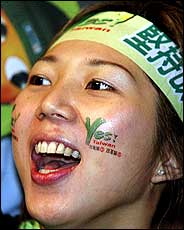
 Among the shooting's odd elements was the seemingly relaxed security around
the president. He stood in a roofless vehicle driven slowly through a crowded,
two-lane street. Neither he nor Ms. Lu wore bulletproof vests. Spectators freely
exploded firecrackers along the route, and the police said no one, including the
president's bodyguards, had heard shots being fired.
Among the shooting's odd elements was the seemingly relaxed security around
the president. He stood in a roofless vehicle driven slowly through a crowded,
two-lane street. Neither he nor Ms. Lu wore bulletproof vests. Spectators freely
exploded firecrackers along the route, and the police said no one, including the
president's bodyguards, had heard shots being fired.





 陳總統也呼籲大陸當局,接受台灣民主的選擇,認真看待大選及公投結果,共同開創兩岸和平穩定。兩岸人民相同的聲音,也是國際社會的期待。陳總統表示:「這是新時代的開始,一個國內團結的時代、一個兩岸和平的時代。在強化國防及兩岸對等談判兩項國內公投議題上,也會提出相應具體的作為,以呼應公投的的選舉結果,也呼籲對岸中共當局,盡快撤除對台的武力威脅。」
陳總統也呼籲大陸當局,接受台灣民主的選擇,認真看待大選及公投結果,共同開創兩岸和平穩定。兩岸人民相同的聲音,也是國際社會的期待。陳總統表示:「這是新時代的開始,一個國內團結的時代、一個兩岸和平的時代。在強化國防及兩岸對等談判兩項國內公投議題上,也會提出相應具體的作為,以呼應公投的的選舉結果,也呼籲對岸中共當局,盡快撤除對台的武力威脅。」

 產經新聞駐台北支局長河崎真澄指出,本屆總統選舉超過八成的投票率大約是日本國政選舉平均投票率的兩倍,台灣選民對選舉的投入度和對政治的關心反映出民主化的發展,也凸顯台灣政治的特色。
產經新聞駐台北支局長河崎真澄指出,本屆總統選舉超過八成的投票率大約是日本國政選舉平均投票率的兩倍,台灣選民對選舉的投入度和對政治的關心反映出民主化的發展,也凸顯台灣政治的特色。